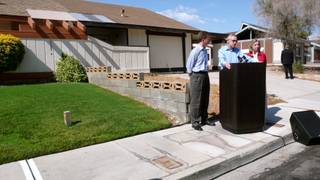Monday, July 6, 2009 | 2 a.m.
Sun Topics
Sun Archives
Sun Blogs
Beyond the Sun
The Obama administration’s announcement that it is loosening equity requirements for mortgage refinancing provides sizable relief for homeowners in Las Vegas, where so many loans are underwater.
The question is, will it be enough?
Housing Secretary Shaun Donovan made national news last week when he announced the new plan in Las Vegas, which he called ground zero of the housing crisis. Nevada has led the nation with the highest foreclosure rate every month since January 2007.
One of the most vexing problems for Nevadans under the original Obama housing rescue plan is that it failed to account for the equity problem that has left nearly 70 percent of Las Vegas homeowners owing more than their houses are now worth.
Without equity, most homeowners could not qualify for refinancing.
Under the original refinancing option, only homeowners whose mortgage was no more than 105 percent of the home’s value could qualify, say $210,000 on a house now valued at $200,000.
That option was of little help in Las Vegas, where housing values are half what they were in June 2006 and an estimated 67 percent of homeowners are underwater. Owners who want lower rates or out from an adjustable loan are stuck.
The change announced this week tweaks that requirement. Now, homeowners who owe as much as 125 percent of a home’s value can qualify for refinancing of their government-backed Fannie Mae or Freddie Mac loans. That means help for those who owe, say, $250,000 on a home now valued at $200,000.
President Barack Obama’s administration has been working on the adjustment for some time.
Just last week Obama told the Las Vegas Sun during an interview that it was considering lowering the equity requirement.
Democratic Rep. Dina Titus had written to the administration twice suggesting the change, and more recently Senate Majority Leader Harry Reid also called on the administration to adjust the equity requirement.
However, bankers and economists had warned against the government taking on too much risk.
Some skeptics worry the government-backed mortgage giants Fannie and Freddie exposed themselves to potential losses if newly refinanced homeowners default.
But Julia Gordon, a senior policy counsel at the Center for Responsible Lending, said the government faces greater risks if more homeowners go into foreclosure.
“From everything we know, the most important move we can make is to prevent people from defaulting at all,” Gordon said. “Once people get into trouble it’s proving extremely hard to get them out of trouble.”
The bigger question, she said, is: “How much it’s going to help, especially in the most underwater states — yours being more premier among them.”
Even though housing prices in Las Vegas have recently slowed their downward spiral, Gordon said the problem is that housing prices have dropped so precipitously that people who bought homes more recently face the biggest equity problems.
Many of those newer homeowners are also those who have adjustable rate loans that hit their peak of popularity in 2004 and 2005, when housing prices were also up. Las Vegas is one of the top areas in the nation for adjustable rate loans.
To be sure, Obama’s initial plan had been an improvement from the 20 percent equity requirements once on the books. But Nevadans complained it failed to go far enough to help them, and may be wondering about this next step.
“We’re hearing it won’t reach that many more people,” Gordon said.
Donovan said the Obama housing plan has already helped more families save their homes than any previous effort. Initially, the $75 billion plan aimed to help nearly 4 million to 5 million with refinancing and 3 million to 4 million with another aspect of the program for those in imminent risk of foreclosure by writing down their principal or interest to no more than about one-third of household income.
But the administration has been unable yet to provide a full accounting. Estimates are that tens of thousands of mortgages have been refinanced or modified and 200,000 offers for modifications have been made.
But millions of homes have fallen into foreclosure nationwide, with more expected. In March alone there were defaults on 10,000 mortgages in Nevada, a record.
The real estate Web site Zillow.com estimates that one-third of the nation’s mortgages are within the 125 percent equity range that would qualify for refinancing under the plan, though not all of those are held by Fannnie and Freddie.
Interest rates have inched back up from their lows when the plan was first announced earlier this year, making refinancing less attractive to some borrowers.
Fannie and Freddie estimate that another 2 million home-owners could be helped with this week’s change, sources said.
Scott Talbott, a senior vice president at the Financial Services Roundtable, an industry lobby representing the nation’s major banks, said every little bit helps.
“The point is to help people stay in their homes,” he said. “It will help a lot.”


Join the Discussion:
Check this out for a full explanation of our conversion to the LiveFyre commenting system and instructions on how to sign up for an account.
Full comments policy